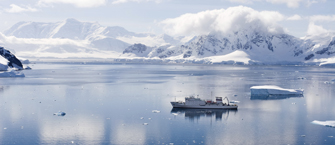The journey

Robert explained: "Our experience of the natural environment began quite dramatically, when we ran into the roughest storm of the season on the Drake Passage. The Drake is widely regarded as the stormiest sea in the world, and we experienced it in full force. 40-foot waves battered the ship, and we were forced to reduce our cruising speed to a level that merely maintained a steady position in the water.
While I ended up getting pretty seasick, this experience introduced a theme for me that was to recur throughout the expedition: a feeling of insignificance. When the view from your porthole looks out on a seemingly endless ocean of enormous waves, with no land in sight, you begin to get some sense of the vastness and power of the natural environment, which is far beyond our abilities to tame.
Meeting the locals
After the two-day crossing, we reached the continent. We spent our first day on King George Island, which contains the highest density of scientific bases in the continent and is often dubbed the ‘capital’ of Antarctica.
We trekked for three or four hours around the island, and visited 2041’s ‘E-Base’, the first educational base in the continent. The base was set up by Robert Swan and his team, and is powered entirely by renewable energy. Because of the winds we’d experienced — which were even stronger on the island than at sea — one of the wind turbines had caused a power surge, exploding a transformer inside the base.
This excursion was also our first exposure to Antarctica’s wildlife. As our landing craft approached the island, a leopard seal swam out in front of us. On the land, there were a few penguins ambling around on the beach. More than anything though, what was striking about the environment was its peacefulness.
Camping in Antarctica
Day three was probably my favourite part of the whole trip, as we camped over on a small island in Paradise Harbour. Even with the rising numbers of tourists to Antarctica, only a tiny minority ever had the chance to camp there.
As we pitched our tents, a glacier nearby would occasionally roar like thunder, and cast huge chunks of ice into the sea across from our island. We huddled round in circles, told stories, jokes, and quite often just looked up at the sky. Because there was no light there (not even moonlight) the sky was far clearer than I’d ever seen it before, and there were even shooting stars every half an hour or so.
Find out more and watch Ellie and Robert talk about their experience in Antarctica.

The experience